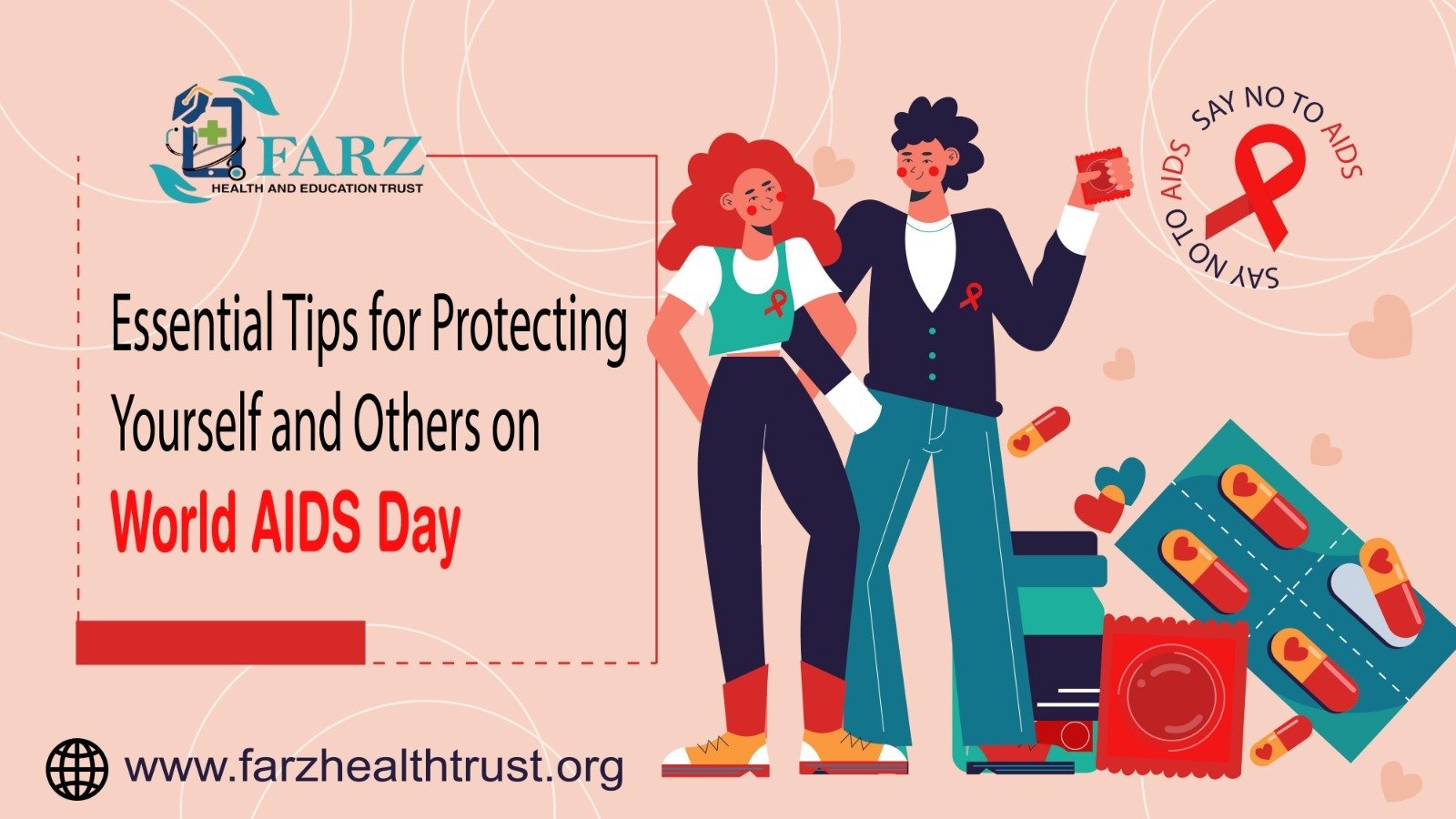
Introduction:
World AIDS Day is an important global observance that serves as a reminder to spread awareness about HIV/AIDS, support those affected, and most importantly, protect ourselves and others. With over 38 million people living with HIV globally, the need for prevention, education, and compassion has never been greater. On this World AIDS Day, Farz Health Education Trust emphasizes the importance of protecting both yourself and those around you through knowledge, preventive measures, and empathy.
This blog post outlines essential tips for safeguarding yourself and others against HIV and AIDS. Together, we can create a more informed and supportive community.
1. Know Your Status:
The first step in protecting yourself and others is to know your HIV status. Regular testing is essential, especially for those who are sexually active, have multiple partners, or engage in high-risk behaviors.
- Get tested regularly for HIV (at least once a year or more frequently if at risk).
- Encourage others to get tested and normalize the conversation around HIV status.
- Remember that early detection allows for better management and a healthier life.
Top 5 Dietary Changes to Relieve Constipation: A Comprehensive Guide
2. Use Protection Every Time:
Condoms are one of the most effective ways to prevent the transmission of HIV during sexual activity.
- Use condoms consistently and correctly, both male and female condoms, during every sexual encounter.
- Condoms not only protect against HIV but also other sexually transmitted infections (STIs).
- Consider using lubricants to prevent breakage during intercourse.
3. Practice Safe Needle Use:
For people who inject drugs, sharing needles or other drug paraphernalia increases the risk of HIV transmission.
- Always use sterile needles and never share syringes or any injecting equipment.
- Take advantage of needle exchange programs or harm reduction services available in your community.
- If you or someone you know is struggling with substance use, seek support from healthcare professionals.
4. Consider Pre-Exposure Prophylaxis (PrEP):
PrEP is a medication that can prevent HIV infection in people who are at high risk of contracting the virus.
- Speak with your healthcare provider about whether PrEP is right for you.
- PrEP is highly effective when taken consistently and in combination with other prevention methods.
- PrEP can be an essential tool for people who are HIV-negative but at high risk of HIV exposure.
Advancements in Critical Care Education and Training
5. Avoid Stigmatization and Promote Compassion:
Stigmatization and discrimination against people living with HIV are significant barriers to treatment and prevention.
- Educate yourself and others to understand that HIV is a medical condition, not a moral failing.
- Support individuals living with HIV by fostering open dialogue, empathy, and inclusivity.
- Avoid judgment and promote an environment where people feel safe to seek help and care.
6. Get Educated About HIV and AIDS:
Education is key to prevention. Understanding how HIV spreads and the ways to protect yourself and others can dramatically reduce transmission rates.
- Stay informed about the latest HIV prevention and treatment methods.
- Share accurate information about HIV with your community to reduce myths and misconceptions.
- Participate in World AIDS Day events or campaigns to learn more and spread awareness.
7. Support HIV Prevention Programs:
Support local organizations and programs working towards HIV prevention, care, and treatment.
- Volunteer or donate to programs focused on HIV education and support.
- Advocate for policies that increase access to HIV testing, prevention, and treatment.
- Help fund initiatives that aim to eliminate barriers to HIV care, such as discrimination, cost, or availability.
The Future of Critical Care: Innovations and Emerging Trends
8. Encourage Regular Health Screenings:
Regular health check-ups, including HIV testing, are vital for detecting and managing health conditions.
- In addition to HIV testing, get regular screenings for other STIs and overall sexual health.
- Regular health screenings help catch issues early, improving treatment options and overall health.
- Encourage friends and family to take charge of their health by getting tested and seeking healthcare when needed.
9. Promote Support Networks:
For individuals living with HIV, having a supportive environment is crucial to their health and well-being.
- Foster a supportive community where people living with HIV feel understood and accepted.
- Encourage mental health support and counseling for those affected by HIV.
- Start or join local support groups where individuals can share experiences, offer encouragement, and educate each other.
10. Advocate for Equal Access to HIV Care and Treatment:
Everyone, regardless of their background or resources, should have access to HIV prevention, care, and treatment.
- Advocate for affordable HIV treatment for all, regardless of income or location.
- Push for global access to HIV services, including prevention, testing, and ongoing medical care.
- Help raise awareness of the disparities in healthcare that affect marginalized communities, ensuring equitable access to care.
Conclusion:
World AIDS Day is not just a time for reflection, but an opportunity to take action. Whether it’s educating yourself, protecting your health, or supporting others, every effort counts in the fight against HIV/AIDS. By following these essential tips and making a concerted effort to raise awareness, we can contribute to a world where HIV transmission is minimized, and individuals living with HIV are treated with dignity and respect.
At Farz Health Education Trust, we believe that through collective effort, education, and empathy, we can build a society where everyone has the knowledge and resources to protect themselves and others. Join us in spreading awareness, promoting prevention, and fighting stigma on this World AIDS Day and beyond.
